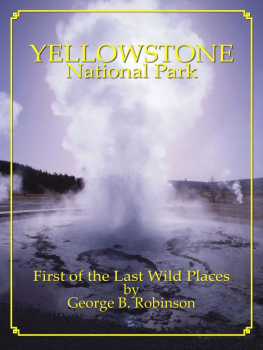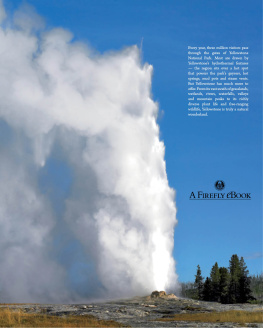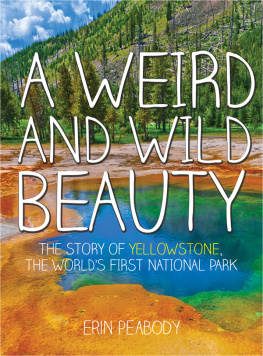ABOUT THE AUTHOR
M. Mark Miller is a fifth-generation Montanan who grew up on a ranch in southwest Montana about ninety miles from Yellowstone Park. His interest in early park travel began when he was a little boy listening to his grandmothers tales of cooking bread in hot springs and throwing red flannel underwear into geysers to tint their next eruption pink.
He worked for Montana newspapers while in college at the University of Montana. After graduating, he was a reporter and editor for newspapers in Utah and Kentucky. He earned a doctorate and became a journalism professor at the Universities of Wisconsin and Tennessee.
Miller returned home to Montana in 2003. He has been researching Yellowstone Park history since then and has a collection of more than four hundred first-person accounts of park travel before 1923. Globe Pequot Press published his book, Adventures in Yellowstone: Early Travelers Tell Their Tales in 2009.
Millers articles on Yellowstone Park and Montana history have appeared in the Montana Quarterly, Big Sky Journal and the Pioneer Museum Quarterly. He is seeking a publisher for his middle-grade novel about a fourteen-year-old boys adventures in Yellowstone Park in 1871, and is working on a narrative history of the encounters between the Nez Perce Indians and tourists in Yellowstone Park in 1877.
He lives in Bozeman, where he volunteers at the Pioneer Museum. Miller presents a program, Sidesaddles and Geysers: Womens Adventures in Early Yellowstone, for the Humanities Montana Speakers Bureau.
Colters Run
(1807)John Bradbury
Indians strip a trapper naked and turn him loose to run for his life.
Although the mountain man era in Yellowstone Park had its heyday in the 1820s and 1830s, it actually began in 1807, when John Colter became the first white man to visit the area. People have told and retold John Colters adventures with embellishments that turn him into a legendary figure like Pecos Bill and Paul Bunyan. But Colter was not a fictional character. He really did cross the plains naked after outrunning hundreds of Blackfeet warriors who were screaming for his scalp. He really was the first white man to visit what is now Yellowstone National Park. And his reports of a stinking place where springs spout steam and boiling water were greeted as fantasy and labeled Colters Hell.
Colter was a member of the famous Lewis and Clark Expedition that first explored the American West beginning in 1803. He came within fifty miles of what is now the park in 1806 when he accompanied William Clark on the return trip down the Yellowstone River.
Later, Colter sought permission to muster out of the Corps of Discovery so he could return upriver with a pair of trappers. After extracting a promise from the rest of the men that they wouldnt seek similar treatment, the captains acceded to his request.
Colter soon broke up with his partners, and he joined Manuel Lisas Missouri Fur Company. In 1807 Lisa sent Colter up the Yellowstone River to make friends with the Crow Indians and bring them back to his trading post. While he was on this mission, Colter passed through parts of what is now Yellowstone National Park.
Apparently illiterate, Colter left no written accounts of his travels. But on a visit to St. Louis in 1810, Colter told his adventures to English writer and naturalist John Bradbury. In a footnote in his 1819 book, Travels in the Interior of America, Bradbury provided this version of the story, known widely as Colters Run.
Colter came to St. Louis in May, 1810, in a small canoe, from the headwaters of the Missouri, a distance of three thousand miles. I saw him on his arrival, and received from him an account of his adventures. One of these, from its singularity, I shall relate.
He trapped in company with a hunter named Potts. Aware of the hostility of the Blackfeet Indians, they set their traps at night, and took them up early in the morning, remaining concealed during the day.
They were examining their traps early one morning, in a creek about six miles from that branch of the Missouri called Jeffersons Fork, and were ascending in a canoe. Suddenly they heard a great noise, resembling the trampling of animals. But they could not ascertain the cause, as the high, perpendicular banks on each side of the river impeded their view.
Colter immediately pronounced it to be occasioned by Indians, and advised an instant retreat. Potts accused him of cowardice and insisted that the noise was caused by buffaloes. In a few minutes their doubts were removed by a party of Indians making their appearance on both sides of the creekfive or six hundredwho beckoned them to come ashore.
As retreat was now impossible, Colter turned the head of the canoe to the shore. At the moment of its touching, an Indian seized the rifle belonging to Potts. But Colter, who is a remarkably strong man, immediately retook it. He handed it to Potts, who remained in the canoe, and on receiving it pushed off into the river.
He had scarcely quitted the shore when an arrow was shot at him, and he cried out, Colter, I am wounded. Colter remonstrated with him on the folly of attempting to escape, and urged him to come ashore.
Instead of complying, he instantly leveled his rifle at an Indian, and shot him dead on the spot. This conduct may appear to have been an act of madness, but it was doubtless the effect of sudden and sound reasoning: If they had taken Potts alive, he must have expected to be tortured to death, according to their custom. He was instantly pierced with arrows so numerous that, to use the language of Colter, he was made a riddle of.
They now seized Colter, stripped him entirely naked, and began to consult on the manner in which he should be put to death. They were first inclined to set him up as a mark to shoot at. But the chief interfered, and seizing him by the shoulder, asked him if he could run fast.
Colter, who had been some time amongst the Crow Indians, had in a considerable degree acquired the Blackfoot language. He was also well acquainted with Indian customs. He knew that he had now to run for his life, with the dreadful odds of five or six hundred against him. Therefore he cunningly replied that he was a very bad runneralthough he was considered by the hunters as remarkably swift.
The chief now commanded the party to remain stationary, and led Colter out on the prairie three or four hundred yardsand released him, bidding him to save himself if he could.
At that instant the horrid war whoop sounded in the ears of poor Colter. Urged with the hope of preserving his life, he ran with a speed at which he was himself surprised.
He proceeded towards the Jeffersons Fork, having to traverse a plain six miles in breadth, abounding with prickly pear, on which he was every instant treading with his naked feet. He ran nearly halfway across the plain before he ventured to look over his shoulder.
He perceived that the Indians were very much scatteredand that he had gained ground to a considerable distance from the main body. But one Indian, who carried a spear, was much before all the rest, and not more than a hundred yards from him.
A faint gleam of hope now cheered the heart of Colter. He derived confidence from the belief that escape was within the bounds of possibility. But that confidence was nearly fatal to him. He had exerted himself to such a degree that the blood gushed from his nostrilsand almost covered the fore-part of his body.
He had now arrived within a mile of the river, when he distinctly heard the appalling sound of footsteps behind him, and every instant expected to feel the spear of his pursuer. Again he turned his head, and saw the savage not twenty yards from him.






